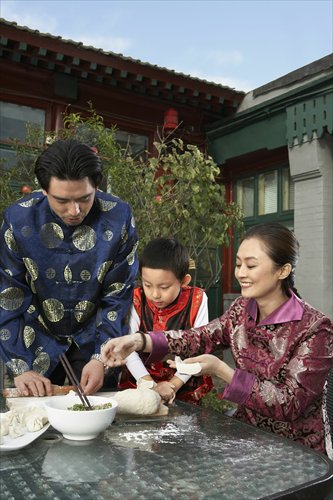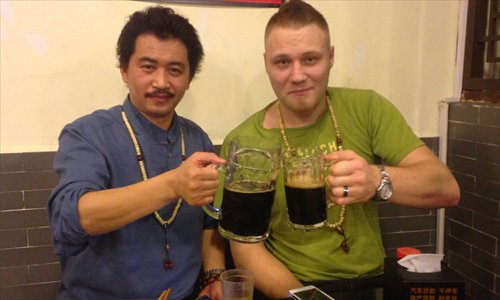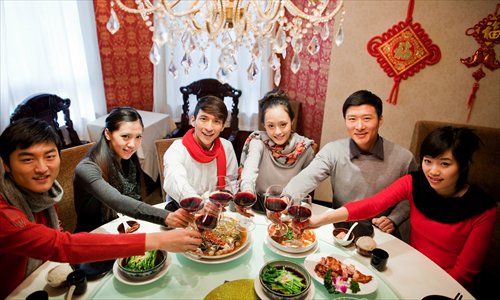Chinese New Year’s Eve dinner gaining traction among both Chinese and expats
Perceived as an experienced foodie by his foreign friends, 28-year-old Chen Chi is a little bit nervous of late. A dozen of his foreign friends have entrusted him with the responsibility of planning and preparing a sumptuous fare for Chinese New Year's Eve.
His friends come from the US, Britain, South Korea and Chile, and they plan to remain in Beijing during the Spring Festival holidays. Knowing that they are curious about Chinese cuisine, some of them gluttonous eaters of Chinese food, Chen was unable to say no when they begged him to cook an authentic Chinese New Year dinner for them.
Chen owns a small restaurant and bar near Houhai; he plans to hold the dinner there, but he has to come up with a menu, as his regular menu of simple snacks, chips, and burgers is not representative of the festive meal. He would also have to cook everything himself since his chef will return home to celebrate the new year with his family. Buckling under the pressure, Chen has come up with a new approach.
"I will resort to buying some dishes online, both precooked dishes and semi-finished ones. It will save me 80 percent of energy compared with cooking the dinner all by myself," said Chen.
While most Chinese people still prepare their dishes for Chinese New Year's Eve themselves, an increasing number are ordering takeout, said Kang Miao, a Beijing-based cook who runs a door-to-door service that offers both precooked and in-home preparation of Chinese meals. He said that more and more people are seeking new ways of having dinner, including some curious foreigners who are anxious to try Chinese dishes.

Chinese New Year's Eve dinner is viewed as the most important meal of the new year and many expats in China are starting to follow this custom. Photo: IC
Selecting the menu
Chen's first choice was to order takeout from the Diaoyutai Hotel, which is famed for food that is said to be on the level of a State banquet. The hotel plans to open an online shop on tmall.com and will cater 6,000 shares to foodies in Beijing and Tianjin, a December 23 Xinhua News Agency report said.
"Not only my foreign friends, but I myself, am quite curious about what State-level takeout is like," said Chen. "It is said that their takeout dishes are the same as what our State banquet serves to foreign country leaders."
According to the Xinhua report, there are two sets of Diaoyutai takeout. Each consists of four dishes and one soup, and they sell for 3,980 yuan ($603.77) and 3,480 yuan respectively.
Chen ordered the more expensive set which contains Buddha Jumps Over the Wall (boiled seafood and poultry), pot roast beef, Huaiyang style meatballs, sautéed vegetables with white fungus, and sweet and sour cuttlefish roe soup.
Besides the dish, Chen said he will give the exquisite bone china tableware that come with the Diaoyutai takeout, which is said to be of national present quality, to his foreign friends. However, because there aren't a lot of pieces, each of his friends will only get a spoon or bowl from the set.
Chen is also considering ordering food from other traditional restaurants such as Quanjude and Yuhuatai, which are famous for roast duck and Jiangsu dim sum respectively.
"We are going to spend New Year's Eve feasting on luxury food," said Chen. "We collected about 10,000 yuan in all from everyone just for dinner that night, so it will be quite exciting."
Besides the Diaoyutai Hotel, which was the first to open an online takeout shop for New Year's Eve dinner, there are numerous other online shops selling set meals. A search for "New Year's Eve dinner" on taobao.com revealed about 5,000.

Jai Harman and his friend have New Year's Eve dinner together last year. Photo: Courtesy of Jai Harman
While more Chinese people are ordering takeout and hiring a cook to make New Year's Eve dinner, many expats still favor cooking by themselves. Photo: IC
Spring Festival cooking lessons
Last year, Kang served a group of expats in Beijing who were more interested in how to cook traditional Chinese dishes than in eating them.
"Many foreigners see Chinese New Year's Eve dinner as a good chance to learn how to cook Chinese food," he said. "They all crowded into the kitchen, five people, asking me tons of questions about Chinese food in poor Chinese."
Kang cooked 10 dishes, including sweet and sour mandarin fish and Beijing style sautéed shredded pork in sweet bean sauce and dumplings. It took him almost half a day, twice the time it used to, because of the endless questions from the curious foreigners. "Although I spent more time with them, it was fun," said Kang.
He said that he taught an American man and two Canadian women how to make braised pork with vermicelli, and they said they will cook it for their families in the future, but they do not know whether it will taste as good without Chinese pork and vermicelli.
Kang's business is thriving.
"I have received over 10 orders for Chinese New Year's Eve dinner this year, and half of them require going to the customers' homes beforehand to cook and later serve them," he said.
"The rest of them all said they would buy semi-finished dishes and precooked dishes online, and all I have to do is to make them edible on the night."
In addition to learning from a professional cook, some foreigners love learning how to cook from their Chinese friends and family.
Jai Harman, a 30-year-old British man who runs a pub in Beijing, relishes new year cooking with his Chinese wife who comes from Harbin, Heilongjiang Province.
His wife taught him some traditional Northeast China style food during their first Spring Festival holidays.
"I learned to cook Kele Jichi (cola chicken), Guobaorou (crispy fried pork), Tudousi (stir-fried shredded potato), Dongbei Luandun (Northeast China style stew with pork, vermicelli and vegetables) and Xiaoji Dunmogu (broiled chicken and mushroom)," said Harman.
He said what he loved making the most was dumplings called Baoqian Jiaozi (money hidden in dumplings).
"The fun part was making the dumplings and hiding the coins in them while thinking of the choking hazard ahead of me. The not so fun part was eating 50 of them only to get a wumao (50 cents) while my wife ate five and got a coin in every one. I have a sneaky suspicion she may have marked them."

Self-made meals still a favorite
Harman is so obsessed with Spring Festival that he brought festival-themed dishes back to his hometown in Britain last year. When he and his wife visited his parents' home in Brighton, East Sussex, it just so happened to be around Chinese New Year, so they decided to do some home cooking and introduce his family to the Chinese festivities.
Harman cooked everything he had ever eaten during Chinese New Year. He made slow-boiled pig knuckles, braised fish and Disanxian (stir-fried potato, green pepper and eggplant).
"Also, to add some Beijing flavor to the meal, I made traditional Beijing noodles with fried bean sauce, which went down really well," he said. "My parents and my friends all liked the food; I also got praise from a few Chinese friends who said it was the only authentic Dongbeicai (Northeast China style food) in England."
While more people enjoy the convenience of ordering delicious takeout online and invite experienced cooks to their homes for Chinese New Year's Eve dinner, Harman said he prefers self-made foods.
"I have seen a rise in people ordering in instead of cooking at home for convenience but, for me, I'm not too interested in trying it. Even though I am sure it would be exquisite food, I think it takes away from the tradition of the family, hunkering down together as a unit and making the magic happen in one's own home," Harman said.
This year, the couple will go to Harbin to spend Spring Festival, and he will cook one of his favorite festival dishes for his wife and her family, sweet meatballs called Hejia Tuanyuan.
"The literal meaning [of the Chinese name for the dish] is 'the whole family should be together,'" he said. "Though going northeast to Harbin for Spring Festival is a long commute, I love it, for it marks the start of the festivities and gets you in the holiday spirit."
Newspaper headline: A bite of Spring Festival